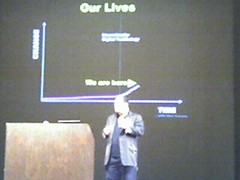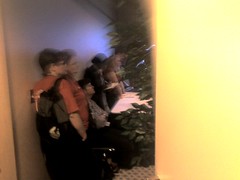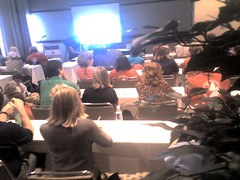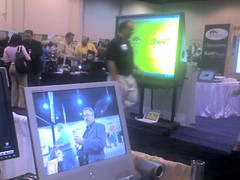 A few days ago I published a blog entry entitled The Rise and Fall of the Hit — and the Textbook Industry. It was originally posted in the Technology & Learning Magazine blog on Monday. London education consultant, Terry Freedman and I engaged in a short discussion that I rather enjoyed, and am compiling here, as much for my record as for yours.
A few days ago I published a blog entry entitled The Rise and Fall of the Hit — and the Textbook Industry. It was originally posted in the Technology & Learning Magazine blog on Monday. London education consultant, Terry Freedman and I engaged in a short discussion that I rather enjoyed, and am compiling here, as much for my record as for yours.
In my post, I concluded…
…So! I got to thinking. Could this happen to the textbook industry?
- What if teachers and pre-service education students started writing little chunks of content, worthy of their textbooks.
- What if a file-sharing network emerged where teachers could search,access, and download snippets of content from each other — world-wide?
- What if teachers started assembling this shared content into theirMoodle sites, or someone writes an open source application specificallydesigned to become the next-gen digital textbook?
- What if we could stop buying text books, and use the money toprovide every teacher and learner with access to the world of digitalnetworked content.
Our homework assignments would change just a bit…
from…
Ya’ll read the chapter and answer the questions at the end!
to…
Ya’ll read the chapter and then validate it by Friday!
The Rise and Fall of the … Textbook Industry
Friend, and fellow Tech Learning Blogarati, Terry Freedman, posted a counter-point entry the next day, Reports of the death of the textbook have been exaggerated, in which he concluded…
What pundits like Dave Warlick and others seem to relish is thesituation in which I. together with my students, can develop our owntextbook. The only thing then standing between me and the failure of mystudents would be the high-stakes testing regime that we all love tohate.
Perhaps we could replace objective examinations with some sort oftouchy-feely alternative. Using our own textbooks to prepare for ourown collaboratively-produced tests, all our students would pass. Itwould, of course, be completely self-referential, and thereforemeaningless, and potential employers and institutions of highereducation will need to do what more and more of them in the UK aredoing already: set their own entrance examinations which students haveto take regardless of their graduation grades.
Reports of death…exaggerated
Please do read Terry’s entire post. It is a compelling and important read.
Of course, I posted a reply, poking fun, but mostly trying to roll the ball back toward center.
Re: Reports of the Death of Textbooks…
Posted on 10/03/2006 09:39 AM EDT
Terry,
A very good post, here. Mind-in-the-clouds,wild-eyed idealists like me would make a real mess of things, if itweren’t down-to-earth, feet on solid ground spokespeople like you. Weall need a curmudgeon 
I’mjust kidding about the curmudgeon thing, because you are absolutelyright. Teaching and learning that is seated in reality needs roots anda sense of authority. But does that authority come from the standards,from the textbook, from the teacher’s professionalism, or from thestudent’s skill in finding the truth themselves. I would maintain thatit’s a combination of all of these and more.
That textbooks willbecome digital, there is no doubt. That teachers produce their ownteaching materials has been happening for years. That students mustlearn to tell the difference between what is true and valuable, andwhat is not, is an imperative. The result will be a reinvention of thetextbook. I don’t know if we’ll continue to call it a textbook, what itwill look like, or how it will behave. I would hope that the textbookindustry wakes up and adapts quickly, because I believe that we needthem. But change will happen, with or without.
The bottom lineis that lifelong learners need to be able to create and cultivate theirown learning experiences, and this is something that needs to be a partof what and how our children learn.
Again, thanks for the counter-point. I do, sincerely, appreciate it.
And Terry wrote…
Death of the textbook
Posted on 10/03/2006 02:12 PM EDT
ROFL. Thanks, David. It’s ok to call me a curmudgeon: my wife isconvinced I’m lining myself up for some sort of Grumpy Old Man of theYear Award. I was, of course, partly being deliberately provocative, toget a debate going <g>
Regardingauthority: I was thinking about that too. I agree with your analysis.Also, I think the authority comes from all the other stuff we bring tothe party, eg involvement in various groups and activities, personalhistory and so on.
Life is a tug-of-war, and it’s fun, if we tug with a smile!
technorati tags:warlick, terryfreedman, textbooks, technology, education
Blogged with Flock
 Then the announcement came and the BBC posted a news flash that “Pluto Loses Status as a Planet“, Thursday, 24 August 2006, 13:34 GMT. In less than 60 seconds, the Wikipedia article is updated with the following line of text added.
Then the announcement came and the BBC posted a news flash that “Pluto Loses Status as a Planet“, Thursday, 24 August 2006, 13:34 GMT. In less than 60 seconds, the Wikipedia article is updated with the following line of text added.






